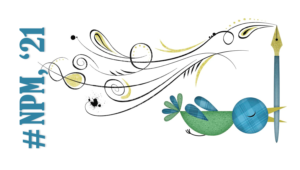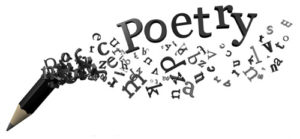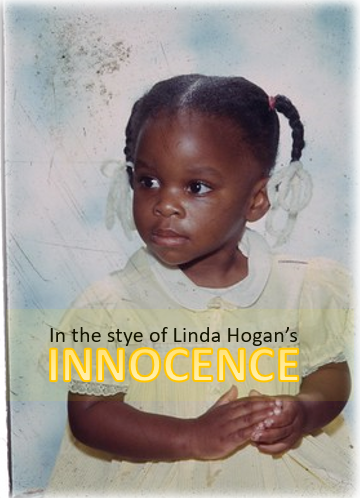Greetings! Welcome to another Poetry Peeps adventure on Poetry Friday!
You’re invited to try our challenge in the month of May! Here’s the plan: We’re going to write an ekphrastic poem using a photograph taken in a museum. We’re sharing a few amongst ourselves, but we’re sure you have some of your own – and it’s a great way to get us revved up about going back to museums! Interested? Good! You’ve got a month to craft your creation(s), then share your offering (or someone else’s) with the rest of us on May 28th in a post and/or on social media with the tag #PoetryPals.

Andi challenged us with Linda Hogan’s poem, “Innocence“ this week, a fitting finish to the entire National Poetry Month celebration. We wanted to go out with a boom and boy was it a doozy. Here’s what Sara did with it. Kelly and Laura are taking a breather this week, but Tricia’s poem is here, Kelly’s is here, Liz’s is here. Andi’s is here. Check in throughout the day to find out what other Poetry Peeps have done. If you’d like more Poetry Friday content, Matt Forrest Esenwine is graciously hosting the roundup at Radio, Rhythm & Rhyme this week. Thanks, Matt!
“Innocence” is beautiful, deep and… utterly inimitable. It falls outside the usual topical sphere for my poetry, so I approached writing “in the style of” from a number of different angles. My Poetry Sisters all threw out their own recommendations, and I tried using haiku, then sijo, then mimicking Hogan’s topics – nature, growth – and her pattern of lines and syllables – 10-6-4. None of that really worked for me, so I set my attempts aside to really think about the title.
Contrary to all appearances, innocence is conceptually complicated, often a loaded concept for some growing up an ethnic minority, female, and/or religious. Some people are never embraced as innocent, witnessed by the number of girls sent home for dress code violations, as if they are only their bodies and are threat and distraction instead of children, or viewed askance because of early maturation, or even early pregnancies. Because there was so much – too much – swirling around a single word, I grounded innocence as far back as I could – to an image from childhood. This poem is based on one of my earliest memories, of watching my older sister at church, who was probably no more than five at the time, wearing what my envious sister eyes determined to be a fabulous yellow dress, standing up to recite with her class. (And yes: this is my sister, nearly five, in The Dress. Some fortymumble years later, I figure she won’t mind if I show her off. She looks the closest thing to a baby, yet I remember thinking she was oh, so grown-up then.)
How much of what we held in childhood do we keep? How do we navigate the passage between childhood certainties and adulthood’s intricacies? What does it mean to be young at heart, or have a child’s optimism and faith? I don’t know. I’m not entirely convinced I was able to go where I wanted to in this poem (you don’t want to know how many times I rearranged lines and fiddled), but as I wrestled with at the eleventh hour, I reminded myself – and you, too: the challenge isn’t perfection, but persistence. So, here we try again:
Be thou faithful unto death &
Is there anything more innocent
than an unformed soul clutching tight her crayoned crown,
as, words a wavering childish treble,
she recites revelation? ablaze with
purity, knowing neither faithfulness
nor death she
stands; stray sunbeam whitening a dress already luminous
proclaiming borrowed words, she is, personified,
a mother’s pride, transformed larger than life
in these two wondering eyes
We grew, wholesome as wheat, but I backward looking, linger to
wonder: who decodes such concepts as
faithfulness and faith? whose hand, holding keys to childhood certainties
points toward one door, while locking tight another? Perhaps
pushing past crowns and covenants, we all return at last
to merely human
a child, I watched, awaiting my turn, lips shaping
each confident consonant. Child-hearted now,
in uncertain innocence, I
claim my chance to choose my crown


Tanita, this is a beautiful poem and your reflection about how you wrote it is intensive and informative. I love this line: “We grew, wholesome as wheat, but I backward looking, linger to
wonder: who decodes such concepts as faithfulness and faith? ” I too have a sister and it made me think about our young life and where we are now. Thank you for sharing.
Tanita, what you accomplished in this poem is not only a descriptive piece but a deep understanding of innocence in childhood and then share adulthood thoughts. I am trying to develop a poem on innocence through the eyes of my one-year-old grandchild and look upon yours with regard.
Child-hearted now,
in uncertain innocence, I
claim my chance to choose my crown
@CVarsalona: Thank you – I am trying to understand! And this poem is still kind of in process, because I think we as adults can only see so far — but I look forward to reading your poem! — I think we as a culture have more to say and more to think about in terms of innocence than we previously believed.
Well, when you come late to the party, others put your thoughts so much more eloquently than you ever could. I suppose I could reply to each commenter here with ditto.
Ultimately, what stood out for me was this:
“who hand, holding keys to childhood certainties
points toward one door, while locking tight another?”
As an adopted child, I always wonder “what if?” What other doors might have opened for me, and what others were closed?
There is so much here to think about. Thanks for sharing your big sister. I looked at mine much as you did yours.
@Tricia Stohr-Hunt: Thank you. I think that’s one of the mysteries — who we might have been shaped by other certainties, shaped by other influences, shaped by other hands — and would we have been more or less? Better or worse? — that we really none of us can shake away from ourselves. Even if we’re happy where we are, there was always an “it might have been otherwise”ness to the past.
T a n i t a.
As much as your glorious, fraught poem I’m fascinated by your reflections on what the world does and doesn’t mean to very young children, and how different the experience of innocence–which we can never have until we are far enough past it to label it–may be for different very young children. And then again: “we all return at last
to merely human…Child-hearted now,
in uncertain innocence”–we never know all that we don’t know, only perhaps that we don’t know everything. Your final stanza is pure music, a revelation. Your crown is ablaze.
@Heidi Mordhorst: Thank you!! The weirdly distorted thing about trying to look backwards at your own childhood is that you never quite see from the same perspective again — I appreciate you looking with me.
I like how you begin with your sister and weave yourself in at the end with new perspective. I agree with others—and like the many layers within your poem and the metaphors, alliteration, and intertwining rhythm you create. You’ve written a poem that calls for readings over and again, thanks for your moving poem Tanita!
@Michelle Kogan: People’s poetic feedback is always so filled with things in my own poem I didn’t see. Where I do the perspective shift kind of shapes the rest of the poem a bit! I can look at this and do a tiny bit more revision — thank you so much for your words!
Tanita, I just read https://www.nytimes.com/2021/04/24/us/makhia-bryant.html a couple of days ago, and that was in my head with the theme of “innocence” and your post. Fraught, indeed. I love the approach you took and that photo of your sister! I’m the youngest of 4 girls (and they’re 5, 7, and 9 years older), and I remember envious sister eyes SO well! “ablaze with / purity” totally mesmerized me–and I could hear your whole poem as spoken word. I don’t often hear poems in my head this way, but this one is just pleading to be read alound, fantastically and with passion!
@laurasalas: Part of every parent’s concern for their children of any color is how the outside world will see them… But if you are a parent whose child is never considered a child or innocent, the burden of correcting their wandering is even harder to bear. I don’t think it’s a topic that has been explored as much in the popular culture, yet it’s a fact of so many people’s lives. Add religion on top of that… expectations and burdens multiply. Innocence is a mere moment to be treasured.
As Liz wrote, I’ve read your poem several times and each time I view another layer, so many. Perhaps it is the personal connection you’ve shown, that yearning as the ‘younger’ to be like your sister, knowing you must wait or wondering if ever you will be. That feels like the innocence to me, that younger children can only view what they believe is ahead, and when they arrive, is that when the innocence disappears? I love your response, Tanita.
@lindabaie: it’s like when we were juniors in high school, envying the seniors… Only to realize when we were seniors that we did not feel mature or confident already to take on everything. But you don’t know till you get there. That is indeed a type of innocence… Innocent of experience.
OH THE LAYERS HERE, Tanita. I mean, first off, that photo — and then the sunbeam and the recitation and the meaning behind any and all of it. And also just that we do what we’re told and believe what is modeled at that age, and is that innocence really? I guess so, if innocence means “not knowing yet.” Oh, man. This is amazing. You’ve got me thinking.
@lizgarton: I’m glad some of where I wanted to end up in the poem is apparent… The innocence of childhood is hard to grasp, because we are basically empty glasses, filled with things we don’t understand but take as fact, until later we realize our comprehension was incomplete. Sometimes our innocent misunderstanding is funny. Other times it’s just confusing and we wish we could unknow what time has taught us… So very layered, and a topic to which I don’t think I can do justice…
Such a powerful, insightful response to the challenge, Tanita! Love this. Innocent & wholesome, we all are at some point…alas, we cannot hold onto that.
I was so curious after our ZOOM meeting as to where you would go with this. Now I see what you were struggling with. Innocence as a religious concept is fraught. But you’ve caught so much here, in that one remembered moment—she truly did not know, in her crayoned crown, anything but what she was asked to do, and she did it with her whole self. I wonder what memories she has of that day? Or any at all? (It’s weird how memory works!)
@SaraLewisHolmes: Her memory is of being so strongly convinced of the rightness of the moment, of being Good. I think pride must have been bound up in that… If only that were enough to hold true goodness to us.